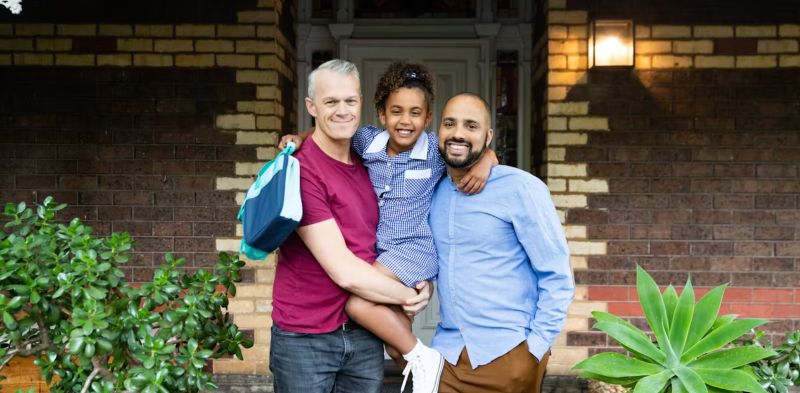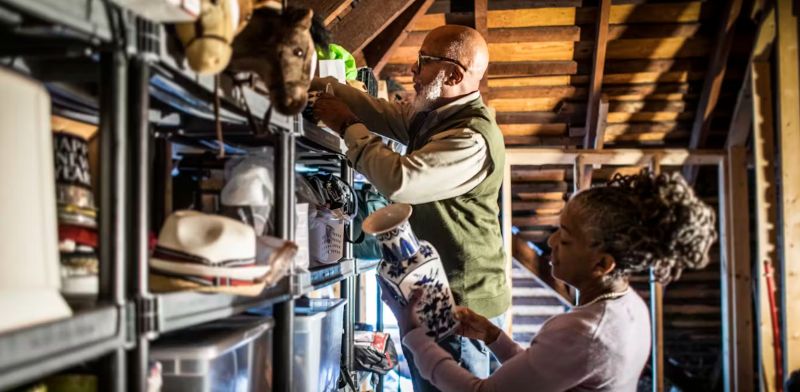
A new program is helping Black children and their caregivers talk about race—and they’re learning important lessons about racial socialization.

By Emily Ha
Program coordinator for the EMBRace Program

By Dr. Riana Elyse Anderson
EMBRace Program Director and Assistant Professor
University of Michigan
Introduction
Generations of Black families have engaged in “The Talk”: conversations centered on contemporary and historical events, ways to respond to racism, and how to have pride in their race. The Talk is a form of racial socialization.
Racial socialization—or the transmission of implicit and explicit messages about race and racism—is used by up to 75% of Black families. Although there is more research done on the use of racial socialization in Black families, families of other races also benefit from the discussion of race. Asian families, for example, use and endorse racial socialization practices that are similar to their Black counterparts.
Racial socialization can be used to teach children the basics about their identity and background even when they are young, often starting at about five years old. As children grow older and begin to understand more about racial dynamics at play in their society, parents may begin to use socialization to prepare them for potential biases or point out instances of discrimination through current events.
We help Black children and their caregivers talk about race through the EMBRace Program—and we’ve been learning important lessons about racial socialization that might help all families reduce racial stress, promote familial bonding, and improve psychological well-being.
Why Racial Socialization Works
For Black families, racial socialization has traditionally been categorized in four ways:
- Cultural socialization: messages that elicit racial pride (e.g., “I’m Black and I’m proud”).
- Preparation for bias: messages that raise awareness of discrimination (e.g., “You need to work twice as hard to get half as far”).
- Promotion of mistrust: messages that emphasize caution and wariness (e.g., “If you’re walking late at night, don’t wear your hoodie up because someone may think you look suspicious”).
- Egalitarianism: messages that encourage colorblind beliefs (e.g., “I don’t see race. I view everyone in the same way”).
Conversations at home vary, with parents leaning more toward certain types of these messages based on discriminatory experiences, interactions with their environment, and family history.
Black youth overwhelmingly experience and perceive racial discrimination—a detrimental stressor and social determinant of health—at rates significantly higher than other racial groups in the United States. Over 90% of Black youth as young as eight years old report facing or witnessing racial discrimination in their everyday environments, like school or online. Racial discrimination often leads to racial stress and produces negative mental health outcomes, particularly internalizing problems (e.g., depression and anxiety). Given the clear relationship between racial discrimination and youth’s mental health, there is an urgent need to use culturally relevant strengths-based approaches that support youth wellness. That’s where racial socialization comes in.
Regardless of racial background, everyone can benefit from talking about race. Our research shows that children who have racial conversations with parents are more likely to have positive psychological and behavioral outcomes in the face of racial discrimination. Racial socialization mitigates the stress youth experience in the context of racial discrimination by expanding their coping strategies and reducing their mental health problems.
Several large-scale or longitudinal studies have indicated the protective relationship between racial socialization and depressive and anxious outcomes for Black youth contending with racism. As middle childhood and adolescence are critical periods of developing a cognitive and experiential understanding of racial discrimination, it’s imperative that parents skillfully and proactively respond using racial socialization strategies.
A recent study from our lab has shown that effective and competent racial socialization—beyond just what is said—can also mitigate the effects of discrimination for children and is associated with better mental health outcomes for youth. Parents who experience discrimination themselves are often worried about the discrimination their children might face. Their racial worry can manifest and show up in their child’s psychological outcomes (i.e., depression and anxiety).
In this study, our lab found that racial socialization competency moderates or modifies the relationship between racial worries and psychological outcomes. Said another way, when parents are concerned about their child’s future experiences with racism, having more competent conversations about race can diminish their child’s psychological distress. Conversations about race may be difficult and stressful at first; however, through practice, parents can become as comfortable and well-versed in racial socialization as they are in other types of general socialization (e.g., “look both ways before you cross the street,” or “wash your hands before you eat”).
Our research suggests that parents can improve their racial socialization competency, and the measurable skills, confidence, and stress inherent in this kind of communication—and that’s why we launched the Engaging, Managing, and Bonding through Race (EMBRace) Program.
How Families Can Talk About Race
EMBRace is an intervention for Black families to improve their racial socialization and coping skills in the face of racial discrimination.
EMBRace consists of five sessions. In each one, the parent and child have individual sessions and joint family meetings with a clinician to discover the ideas behind the program, work on various activities, and have facilitated discussions.
The first four sessions cover common practices of racial socialization. For example, the first session focuses on the tenet of cultural pride. The parent and child are tasked to co-create a cultural family tree, emphasizing elements of racial socialization, coping, and bonding. In the fifth and final session, our program encourages the parent and child to review and practice using all of the skills learned from the previous sessions.
As EMBRace’s vision is centered around providing Black youth and families with skills to resolve racial trauma and race-related stress while promoting healthy coping skills for racial encounters, we also encourage the incorporation of therapeutic practices that can help individuals identify and work through race-related trauma responses. One example of a strategy that we have incorporated into the program is CLC-BE, or Calculate, Locate, Communicate, Breathe, and Exhale:
- In the first step, Calculate, the individual rates their stress on a scale from 1–10 as they anticipate, engage in, or remember a racially stressful encounter.
- Next, they Locate where they feel the most stress in or on their body.
- Then, they Communicate that feeling of stress to someone else or to themselves.
- Finally, they slowly Breathe in through their nose and Exhale through their mouth.
This practice, developed from other cognitive behavioral strategies, is one that anyone can use to help combat the negative impacts of race-related stress. As racial socialization can affect the extent to which individuals believe that they have the capacity to control or manage stressors, CLC-BE can play a significant role as a healthy coping strategy by allowing people to identify, evaluate, and release stress from the racial encounter.
EMBRace not only aims to address the impact of race-related stress throughout the duration of the program, but also strives to provide Black families and their children with tools that they can carry with them outside of this program to utilize in any of the spaces that they may enter, such as home, school, or the workplace. While EMBRace is geared toward Black families, the principle of racial socialization and associated strategies are widely applicable in empowering youth of all races.
A pretest and posttest help assess a number of factors, including the parent and child’s self-efficacy when it comes to using racial socialization in multiple areas of their lives. Our studies of EMBRace have shown improved coping skills of Black parents and children after completion of the five sessions.
Avoiding Pitfalls
Although parents tend to anchor their conversations on current events, they do not need to wait for a negative racial encounter to have conversations with their children about race. Rather, parents can be proactive and teach children about the history of their culture to instill a strong self-concept and prepare them for future events.
Unfortunately, racial socialization may be challenging for parents who have not done their own discovery before talking with their children. However, such challenges can be addressed through psychoeducation and self-exploration. For example, families that rely solely on the tenet of promotion of distrust could foster negative attitudes about others more than positive attitudes about oneself or one’s group.
One activity that families can do to address these feelings of mistrust is to journal about an experience in which someone was silent or told to not talk about race and have a discussion about this experience. Parents and children can discuss how it made them feel and what the “pros” and “cons” are in discussing race.
In an environment where racial inequity and injustice are so prevalent, it is important for youth and parents to feel confident in navigating a racist world. The summer of 2020 further illuminated the issues of racism that are sewn into the fabric of our country. With endless stories of the health disparities between Black people and their counterparts surfacing and the racialization of the COVID virus resulting in anti-Asian violence, it is clear that the longstanding problems associated with racism need to be addressed.
Racial socialization is a practice that can help all parents communicate with their children about race and racial discrimination. Interventions and programs like EMBRace are necessary for families to build their racial socialization competency, resulting in healthy ways to cope and resolve racial trauma and stress. Racial socialization is critical to helping families foster an environment where they can deal with the racial stressors and discrimination that are prevalent. Through racial socialization, parents can empower youth and raise a new generation of leaders who can work toward the greater good.
Originally published by Greater Good Magazine, 06.21.2022, under a Creative Commons license.







